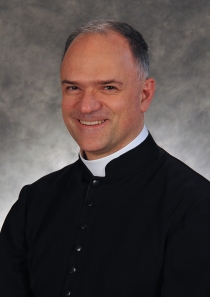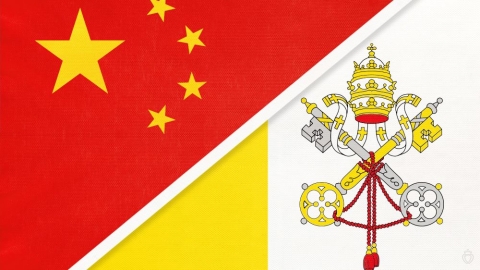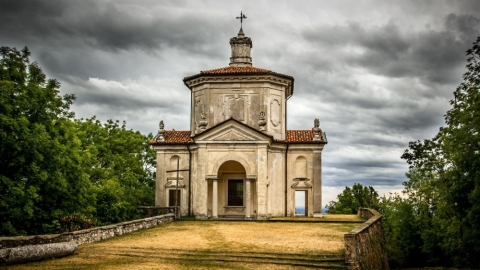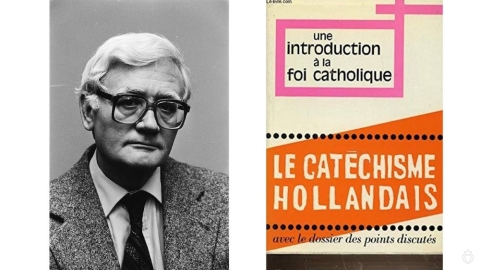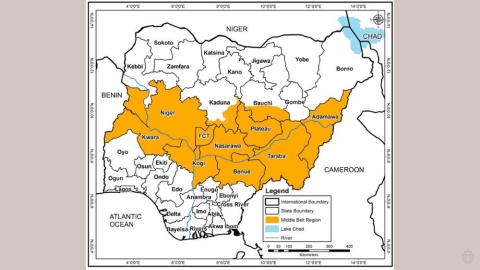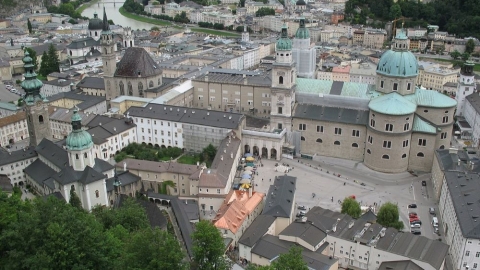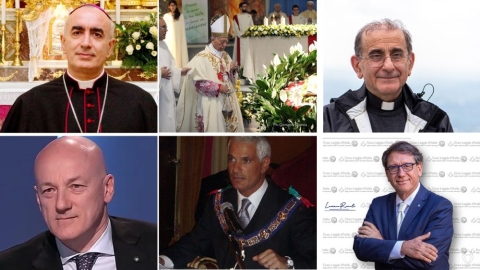“Fiducia supplicans”: A synodal Church listening to the world
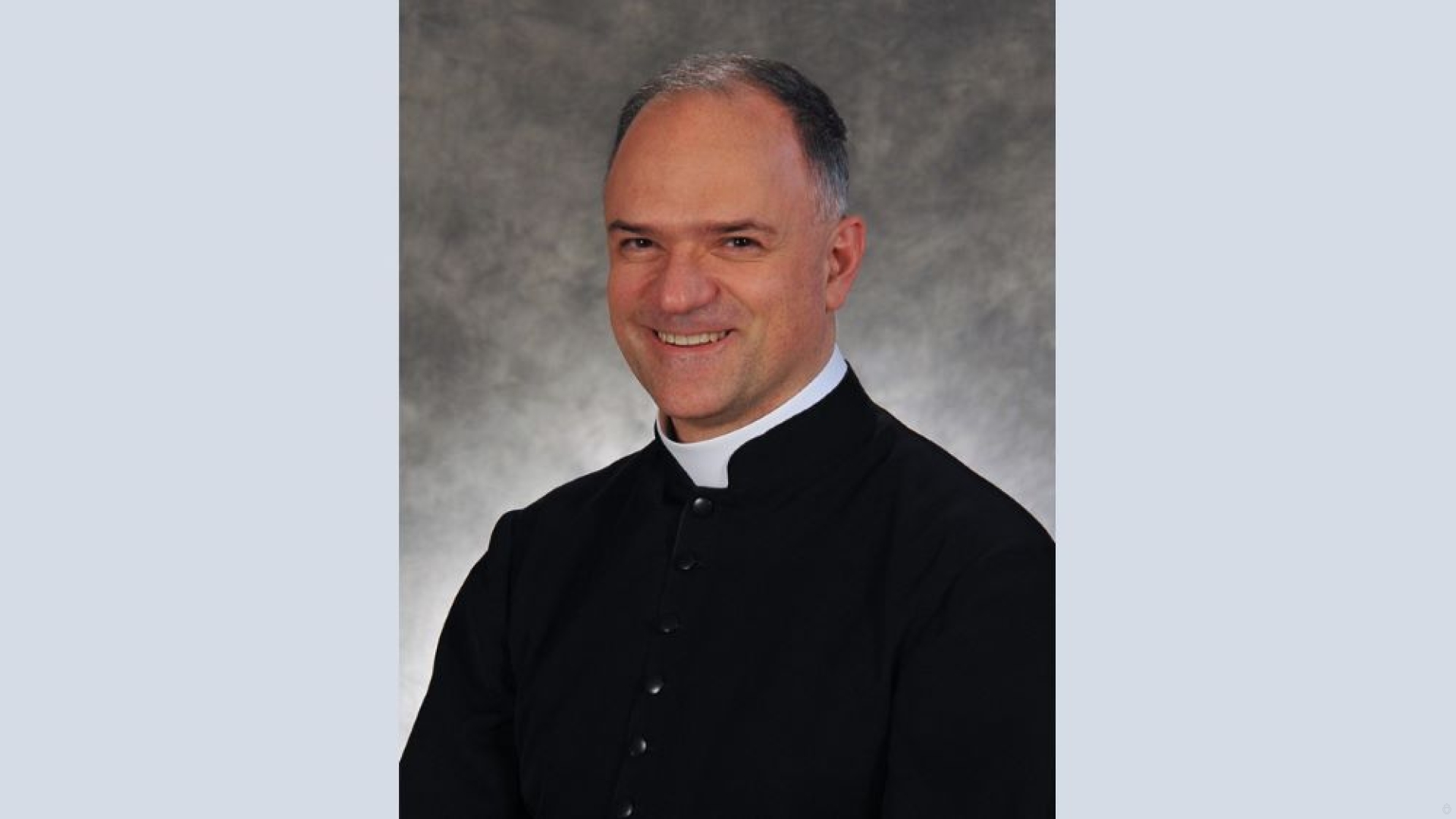
Conference of Don Davide Pagliarani, Superior General of the Society of Saint Pius X, XVII Theological Congress of Courrier de Rome, Paris, January 13th, 2024.
“THIS SYNODAL CHURCH IS A CHURCH THAT CLAIMS TO BE LISTENING TO EVERYBODY – WITH ITS FEET FIRMLY PLANTED IN THE FEELINGS OF THE PEOPLE OF GOD. HOWEVER, IN REALITY IT IS SIMPLY UTOPIAN AND MILLENARIAN!”
It has come to me to offer a synthesis, and to explain the Society’s position in relation to the different realities promoted by the “synodal Church”.
First of all, we need to try to put some order into all the different elements concerning this synodal Church, and in particular, the recent document, Fiducia supplicans, which has already generated a considerable amount of commentary. This event needs to be put into its true context. How did we get to this? What does it all mean? The role of the Society of Saint Pius X cannot be limited to immediate and instinctive reactions. It is up to us, to deepen as much as possible our understanding of what is at stake in this text. If our analysis lacks depth, we run the risk of falling into the same trap as others, who have reduced the problem of Fiducia supplicans to a personal eccentricity of Pope Francis, and whose extravagances cannot be explained.
Other reactions to Fiducia supplicans have reduced the problem of these “blessings” to a question of opportunity, and that this initiative would be inappropriate in certain cultural contexts, particular in Africa. In truth, the reality is rather more complex. Nevertheless, all these different reactions are certainly welcomed. They are good in the fact that they show that there is still a capacity to react. However, the Society needs to go deeper. So therefore, let us start by taking a step back from all the media furore.
I - A pontificate that corresponds to the expectations of the modern world
Strictly speaking, Fiducia supplicans is not a synodal document, but one produced by the Dicastery for the Doctrine of the Faith, and signed by the Pope himself. Nevertheless, it is a document that responds to what was raised on many occasions in the preparations for the synod. It is therefore a response to a current and synodal expectation.
This “synodal Church” that we are trying to define, is a Church that listens to all people, including those in the peripheries and the grassroots – absolutely everybody, and without exception. It is a Church that listens to “the world” itself. It is therefore a Church with a new sensitivity and a new willingness to go out and to meet the world.
In reality, the current pontificate corresponds more and more perfectly to the expectations and the demands of the modern world, and more specifically of the world of “politics”, in the widest sense of the term. In fact, on the one hand, this pontificate corresponds to a political vision that is shared universally in today’s world; and on the other hand, it has also adapted itself to the political methods that seek to create a new social organisation and which, it must be acknowledged, have already largely triumphed. So why is the presence of the Church’s representatives so important in this reorganisation of the world?
This is not the first time we have seen this way of doing things. When new principles are introduced, or when a new society is being built and reorganised, it is necessary for a religious institution to make these principles “sacred”. This is quite clear, and corresponds to a necessity rooted in the hearts of men. Deep down, man will always have a religious dimension. He needs to believe in something, and therefore needs to make “sacred”, even something that is basically not sacred at all. It is a need that is very often unconscious. However, it is rooted in human nature. Why is this so? Because man was created for God – and not even a revolution can change human nature.
Sooner or later, the sacred must impose itself, so as to give a transcendent dimension to what we believe in, and to the principles that we consider to be fundamental. You can see this quite clearly in history. Ancient civilisations sacralised everything that was important to them. They sacralised power, strength, fire, the earth, fertility, etc. Much closer to our times, the “French Revolution”, which was a liberal revolution did the same thing. Since it was fundamentally secular, it implemented a total rejection of the past, and a desacralisation of everything that was part of the old system, including religion… Yet at the same time it insisted on raising human reason up to the level of the “sacred”, as it were. Another example would be the Declaration of Human Rights. Declarations are made every day – especially in this day and age. In the best of cases, most declarations are remembered for a few weeks – but they are certainly not kept forever. However, in contrast, the Declaration of Human Rights seems to have left a permanent mark on history. And why is that? Because the Declaration of Human Rights is not just a simple declaration – it is a fully fledged creed! It was written with the solemnity of a profession of faith. It responds to the religious need to render these new principles and these new dogmas sacred, on which modern contemporary society was to be built. There are also many other examples we could use.
So, what is the Pope doing? What is the Church doing? Unfortunately, they are moving in the same direction. They are rendering sacred things that are fundamental in the eyes of the today’s world. Here are just a few examples. We all know that ecology is preached and taught by the Holy Father. This new “ecological” theology goes beyond simple considerations of expediency that are purely linked to a moment in history. It is a new morality preached to everyone. It is a transversal morality proposed even to atheists. Why is this so? Because we must all respect this common home that we call “creation”, which came from the hands of God, but which in itself, regardless of how we conceive it and how we may call it, is the common home of all men. This implies a religious character, a religious stamp, if you like, embossed on a proclamation, and an urgent demand of today’s political world – and so, the Church has intervened to give it her religious stamp, which, as we have seen, responds to a very real human need.
Another example would be the insistence on the need to dismantle hierarchy. For them, there is a need to move away from a hierarchical vision of society – and from a hierarchical vision of the Church. They now advocate a society where power is no longer hierarchical. Power is distributed and redistributed. Hence the necessity to share authority, to fight against clericalism, and to promote the emancipation of women. This is a subject that has been on the agenda for some time now. Today, the Church wants women to have their own place, even within the hierarchical structure of its government. All this is presented to counter traditional patriarchy, which is considered to be the systemic and institutionalised cause of a series of abuses of power throughout history. Understandably, among these modern values that are being proposed to all – and in particular to the Church so that it can make them sacred – is the LGBT agenda, as it is one of these “values”. We are therefore witnessing the implementation of a synodal sensibility that must inevitably conform to the sensibility of current times, including those “values” just mentioned.
The Pope is rendering sacred things that are fundamental in the eyes of the today’s world. Fiducia supplicans responds to a political need.
Meanwhile, there is also another aspect that deserves our attention. The Church has realised that, for various historical reasons, it has lost credibility and therefore it has lost influence in the world. In this scenario, it believes that it needs to preach what is “up to date”, in order to remain credible. Unfortunately, this is an inevitable outcome: having lost sight of the supernatural dimension of its mission in the world, the Church begins to have a “complex” with the world because it has lost its prestige and credibility. Therefore, it looks for other ways to try to remain credible. Thus, as it wants to be understood by the world, the Church starts to speak the same language as the world. However, this is a terrible illusion because the Church was not made for that. It is obvious that the Church was never made to limit itself to a horizontal perspective.
Here, we can already draw an initial conclusion that will help us to put Fiducia supplicans in its proper context. Why did this have to happen? Well, paradoxically, the secular world still needs the Church and this religious “stamp” that only the Church can give. And the Church, which has lost its credibility, paradoxically, still needs the world! This dual need has created a real symbiosis, a synergy on this political terrain. Fiducia supplicans responds to a political need of the moment.
II - What does it mean to align your speed with modern political sensibilities?
Allow me to digress for a moment into philosophy, so as to get to the heart of the matter. This modern political perspective depends on modern thought. It is the reflection and the image of modern thought. And modern thought starts from a fundamental category that is new, which is the conscience – be it collective or individual. It is from his conscience that modern man will firstly reconstruct his own thinking, and then reconstruct the world around him – a world to which even the Church will have to adapt.
However, putting the conscience as the principle and foundation of everything else means using a principle that is dissociated from reality. Now, a principle dissociated from reality, in all cases, loses its primacy over intelligences. With this, we go beyond the idea that there is an objective order to be grasped and to which we must conform. No, in this new order, it is man who establishes the order, it is his conscience that discovers this order within himself, and after which, on the basis of this idea, he then constructs the world around himself – and this is modern politics, in the broadest sense of the term.
In other words, there is no longer a finality or a perfection in the order of things. The happiness of man or of society, is no longer to be found in a finality that they have received and that conforms to their nature. This external order of things no longer corresponds to what the conscience will now define. The human conscience itself is the new principle of a new order in the world… and thus, there is no longer any finality or perfection in the respect for the objective order of things.
Consequently, we will find four inseparable traits in modern politics, which will equally be found in Pope Francis’ Church, in the synodal Church.
First of all, modern politics is ideological. It is ideological insofar as it replaces reality with the free representation that the conscience has made for itself. It speaks for itself: Ideology accompanies every expression of modern politics. Behind every political party there is not a grasp of objective reality – there is only a subjectivist ideology.
The second trait of modern politics is it is self-determining. This is an inevitable consequence. It decides for itself what politics should be, and what man should be. It constructs its plans and projects all by itself, without taking reality as a starting point, nor starting with an analysis of reality.
Modern politics’ third trait is that it is totalitarian. Behind the image of “freedom” – that “liberation” that has been touted for centuries, and especially since that liberal revolution – modern politics is totalitarian, because it is reality that must conform to it, even if it means using force. An idea conceived in the individual or collective conscience is plastered over concrete reality, and reality is thus obliged to conform. This is where totalitarianism comes from. We live in a totalitarian world where ideas are plastered over reality, forcing reality to shift in one direction or another.
Finally, the fourth trait is it is conventional. Modern politics is not based on the natural order of things, but on a conventional order. What is good and what must be pursued is no longer understood and accepted on the basis of examining reality, but it is now decided and chosen arbitrarily by the conscience.
While these four traits of modern politics are not new, it is interesting to see how they apply to the synodal Church in particular.
However, before we look at how it applies to the synodal Church, we need to understand that the Catholic Church cannot remain indifferent to this modernity. There are only two possibilities. There is no third option:
- either, the Church condemns this primacy of the conscience over reality and over Divine Revelation – and everything in modern politics that flows from it;
- or, the Church enters into this new system.
However, this system is everywhere. This new perspective with its new vision of things is omnipresent. We cannot claim to remain neutral, trying not to expose ourselves to it too much, and trying to avoid condemning it too much, trying to negotiate and trying to gain something positive from it. Absolutely not! What did the Catholic Church do up until the Second Vatican Council? It simply condemned this system. However, today, the Church has entered into this system. It has made it its own, and now the Church blesses it. This is what is so important for us to understand.
This synodal Church is, in its own way, ideological. It creates pastoral needs that exist only in the minds of those who conceive them. Doctrine is no longer received, it is produced. For example, do you really think that there are millions of LGBT couples in the world asking for the Catholic Church’s blessing? Absolutely not! But, for the reasons we have just seen, it is important for the Church today to give a sign – a gesture. Documents such as Fiducia supplicans have a political value for the world, regardless of the actual requests for a blessing, regardless of the pastoral requirements, and regardless of the number of blessings that will actually be given. It doesn’t matter if there are people who are against it, or even if whole episcopal conferences are against it - at the very least, that doesn’t matter. What is important is that these texts have been written and published for their political significance.
The synodal Church is totalitarian and ideological.
In the synodal Church there is also the self-determining aspect. This is because the Church no longer conceives itself as an immutable structure, given by God with immutable objectives and an immutable mission. Today, it is a Church which, according to historical circumstances, and above all according to the needs of the moment, is capable of revitalising itself, and giving itself a new finality, but which is always capable of evolving.
The synodal Church is also totalitarian. Why is this so? Because the Church, as a social body, is forced to conform to principles that are not connatural to it. The reality of things is being violently distorted, and hence the various reactions – be they perfect or imperfect, complete or incomplete. It has often been mentioned that there is an apparent contradiction between a synodal Church, open to everybody, and where everybody can speak and participate, etc., and at the same time a Church that imposes very authoritarian acts – in particular, on the part of Pope Francis, or at least since the beginning of his pontificate. This contradiction has been pointed out, so how can it be resolved? The answer is simple: the synodal Church is totalitarian! Theoretical concepts and ideas are plastered over reality, even if they do not correspond to it. When violence is used to force things your way, you are totalitarian. Church authority is being used to force things, while at the same time claiming to be listening to everybody.
Lastly, the synodal Church is also conventional. In theory, it is the synodal base that suggests the government’s choices. What is decided is always presented as such: the people of God, as a whole, through their sensus fidei, have suggested a particular path or road to take.
So all the above gives us the key to help us understand current events. The major decisions of this pontificate must be viewed as a desire to conform as closely as possible to the major principles of today’s world – and the political world – with all that this can entail.
III - The synod, a revolutionary instrument
Let us now look at the synod as such, in this context. Does the synod have a particular role to play?
I will not dwell on the theological and doctrinal aspects here. The synod is simply the expression of collegiality, of this desire to govern the Church together, from the grassroots up.
Alongside this, there is a practical, or we could also say a “political” function of the synod. What is this purpose? The synod serves to circulate ideas that they want to pass on, that they want to transform into law, by attributing them to an expectation, a request or even a need of the people of God. Understandably, the Church cannot fail to respond to something everyone in the Church seems to be asking for, since it is attributed to the sensus fidei. Inevitably, however, in everything the people of God ask for, we will find an echo of everything today’s world expects of the Church.
If you look at the synod’s working document Instrumentum laboris[1], published a little over a year ago, you will find everything. It is an enormous blob - a shapeless mass with everything and the opposite of everything in it. However, with such a document in their hands, the authorities choose what they think is best: “This is the moment to act on this point, the time is ripe, the situation is ready, we can move forward on this one…”.
So, what are the inevitable consequences of this? By always saying “yes” to everything and the opposite of everything, without starting from a doctrinal principle, and without starting from reality, but only by listening to everybody’s expectations, we end up doing things that are out of touch with reality.
It is important to stress this aspect of disconnection from reality because this synodal Church is a Church that claims to be listening to everybody – with its feet firmly planted in the feelings of the people of God. However, in reality it is simply utopian! This “blessing” envisaged by Fiducia supplicans is not just a mistake, it is a utopia! It makes no sense, and behind it lies the chimerical dream of a new world – with a completely renewed Church following it. It is a sort of millenarianism. It is a utopian, millenarian illusion, completely outside of reality.
However, the concrete reality – true reality – that the Church is called to know and to preach, is the reality of the Gospels, of Catholic Dogma, of Divine Revelation, of Our Lord Jesus Christ, of Catholic morality, and of the fight against sin. But for these reformers, all this has become an abstract reality that no longer has any influence on daily life. In their perspective, what counts is the relationship with the people of God. This is considered to be the only concrete reality, despite all of its utopias, and is radically in contradiction with everything that is considered to be Church doctrine. Church doctrine is not denied directly by them – it is simply set aside, as an abstract truth.
The Church today has become caught up in this system. It is chained to this system, bewitched and bogged down in this system… Out of necessity, the Church listens and tries to satisfy all the expectations of everybody, without indicating any finality nor any ultimate perfection. There is no longer any transcendence nor supreme good to attain - who talks today about eternal life?
Just look at the state of the Church today! It is currently experiencing a worldwide debate about these “blessings”. Fortunately there have been reactions. But you can see where we are at… While entire episcopal conferences and the world are debating whether to bless or not to bless homosexuals, we are no longer talking about the Gospels; we are no longer talking about Our Blessed Lord; we are no longer talking about sanctifying grace; we are no longer talking about the Cross… Why? Because all that is too abstract.
The Church’s hierarchy today finds itself in a similar situation to that of fathers of families after 1968. I’m talking about the post-1968 disillusioned fathers who no longer knew why they had children. Since the 1968 crisis, and the gradual deterioration that followed it, a family father does not know anymore why he is a father. He no longer knows towards what he should educate his children, nor why he should educate them. So what does a modern-day father do?
First of all, the family needs to hold together. For if there is no longer a goal to be achieved in educating the children – which fully justifies the role of the father and the mother – the family risks breaking apart. However, even if the father manages to hold his family together, his role is reduced to responding to simple material concrete demands. The child is hungry: therefore he needs food. The child needs education: he is sent to a school. He needs exercise, he needs a doctor, he needs clothes… and for all this, we do not know the reason WHY. Instead of indicating the purpose, the only response is to various requirements – good or bad – but which remain contingent. This is devastating.
The synodal Church corresponds to this diminished, handicapped fatherhood of post-1968 families. And what do children often ask for? Definitely not education and instruction – they ask for their latest whims!
IV - Fiducia supplicans: an old story
With these various considerations, we have put in place the reasons behind this possibility of blessing unmarried and same-sex couples. However, we also need to look at this recent event as a new chapter in a much older story. This is something that is important for us to understand as it is in fact the Church yielding to the pressures of modern society.
Where does this pressure come from? Why is this coercion so strong? If we want to understand the seriousness of what the Church decided, we need to understand the extent of the pressure that the Church is under.
Firstly we need to bring to mind a principle: Revolution, by definition, destroys an established order. I am talking here about a Revolution with a capital “R”, and in the broadest sense of the term, which encompasses all possible types of revolutions. Revolutions destroy all established order, and to achieve that, they must destroy all distinctions because where there are no distinctions, there can be no order.
For example, why is there an order in a family? There is an order because there are distinctions. The father is not the mother, nor the grandfather, nor the child, nor the son, nor the daughter. The father is the father and nobody else. Likewise, the mother is the mother and nobody else. In a family there is a naturally established order, and each member is expected to fulfil their part, which enables the family to achieve its purpose.
Since revolutions destroy all order, it must destroy all distinctions, not only in the family, but also in society as a whole. Why must it destroy? Let’s try to look at these principles in a theological way. Why does a revolution need to destroy all distinctions?
Quite simply because distinctions, in one way or another, derive from or lead to the most fundamental distinction, which is the distinction between the human and the divine – between man and God. The first revolution began with Lucifer – who did not accept the distinction between himself and God. The whole battle-plan of modernism, which mixes the supernatural with the natural, is simply a demonstration of this revolution. Divinising the human conscience is another way of eliminating this fundamental distinction. In this way, man becomes the principle of good and evil. He becomes the principle of truth and falsehood.
From this point of view, all traditional distinctions, linked to common sense, must be suppressed, because they are traces of this fundamental distinction already mentioned. They are an echo of the first and ultimate distinction between man and God. These distinctions are an integral part of a rejected order that needs to be reconsidered – from top to bottom. Very often language is interfered with: certain expressions and certain words can no longer be used. They are demonised, and especially if they are expressions that reflect traditional distinctions.
Some very concrete examples would include the traditional distinctions between a teacher and a student; between an employer and an employee; between parents and children; priests and laypeople; there are also the distinctions between different nations, or between different religious creeds. These distinctions are eliminated or at least re-evaluated. Emphasis is placed on what people have in common: the earth, our common home, the dignity of man, human rights, and so on.
[1] The working document for the first session of the Synod on Synodality (October 2023), “Enlarge the space of your tent”.
Rebuild the order that was destroyed by sin, and that is being destroyed throughout history by revolutions, this is the mission of the Catholic Church, this was the reason for the Incarnation.
However, in concrete terms, what is the final distinction that needs to be destroyed? What is the distinction that is most deeply rooted in the physical nature of man and all animals? What is the distinction that came directly from God’s hand on the day of creation? So, what is this distinction? He created them male and female.[2] God created male and female animals. God created man and woman. This distinction is the first and the most obvious – and with this distinction God linked very specific functions and very specific roles.
If you remove this distinction, or if the world can no longer understand this distinction, how can you explain the beauty of paternity? Paternity, or fatherhood, is an emanation and an application here on earth of the authority of God. This beautiful concept is part of Divine Revelation. It is Saint Paul who emphasises it. A father who sees his mission as an extension of God’s mission of creation is something that is so noble! However, nowadays, all this is becoming incomprehensible and must be destroyed. They want to arrive at a humanity where nobody no longer understands who is a man or a woman, or even what is male and female. This distinction must be wiped out – at least in people’s minds.
So, in reality, this process has come a long way, and for a very specific reason. It is necessary to understand it with all its ins and outs. Behind it all is a diabolical will – in the deepest theological sense of the word. It is Satan himself who first refused this distinction, and he wants everybody – without exception – to follow the same path: “You shall be as Gods”[3].
And the elimination of all these distinctions, especially this final one, leads to the self-destruction of humanity. It is a humanity where there is no longer a father and no longer a mother – because they no longer know what a father or a mother or a man or a woman is. This is a civilisation that is destined to die out. It cannot continue. But why cannot it continue? Because Satan is homicidal. From the very beginning, he has been trying to deceive man in order to destroy him – and he is succeeding! Today, everybody must accept these new principles, and the abolition of distinctions, obviously, with a certain tolerance and with nuances, because the real game has to be skilfully hidden from view. Nonetheless, the fact is that everybody today is obliged to accept, in one way or another, the abolition of these distinctions, and therefore obliged to accept the new order of things that they imply.
Yet, why did the Incarnation take place? Why was the Catholic Church founded? What is the role of the Church? What is the role of the Pope? It is precisely to combat this error! It is to point out these distinctions – and starting with the first distinction between God and man, and all those that follow on from it. Their role is to rebuild the order that was destroyed by sin, and that is being destroyed throughout history by revolutions. This is the mission of the Catholic Church. This was the reason for the Incarnation.
Yet what are Catholic churchmen doing today? Not only they are going along with the world, moving in the same direction as the modern world, but they are also giving it their blessing! So here you can finally understand the seriousness of Fiducia supplicans. It is important that each and every one of us makes an effort to understand exactly what is at stake in what is happening today. The agenda has been established. It does not really matter whether these blessings are given or not, perhaps it is not the right time, maybe later, maybe not in Africa… No! The real problem is much more serious: Catholic churchmen have blessed these principles. So, for us, how can we explain it?
V - Is Pope Francis solely responsible?
Alas, it had to come to this. Yes, we are scandalised, but we are not overly surprised. But why did it have to come to this? Because morality is the fruit of dogma and of the faith – and not the other way round. I define my rules of conduct in terms of what I believe about God, man, the soul, sin and redemption. It is on the basis of what I believe to be true that I establish my rules of behaviour.
Therefore, let us take the example of religious liberty, which is the most striking expression of modern error, and of the decadence of dogma and faith. Religious liberty has been preached for over sixty years – ever since the Council. So, what can you expect? If we can choose our God, choose our own idea of God, or even choose to have no idea of God at all, a fortiori, we can choose our rules of behaviour and morals – and we can also choose what we want to be. If we are not happy with what God gave us or the way that God made us (according to some bizarre idea of natural law), we can thus choose whether we want to change who we are, and be something different. Why not? Since we can choose our own God and our own religion – and this is what the Church teaches today – then a fortiori, we can also choose anything else, like with whom we are going to live, and with whom we are going to start a family – or some sort of “family”…
[2] Gen. 1:27-28 “And God created man to his own image: to the image of God he created him: male and female he created them. And God blessed them, saying: Increase and multiply, and fill the earth, and subdue it, and rule over the fishes of the sea, and the fowls of the air, and all living creatures that move upon the earth.”
Matt. 19:4 “Who answering, said to them: Have ye not read, that he who made man from the beginning, made them male and female?”
Mark. 10:6 “But from the beginning of the creation, God made them male and female.”
[3] Gen 3:4-5 “And the serpent said to the woman: No, you shall not die the death. For God doth know that in what day soever you shall eat thereof, your eyes shall be opened: and you shall be as Gods, knowing good and evil.”
If we can choose our God, a fortiori, we can choose what we want to be.
Another example would be ecumenism. So what is ecumenism? It is flirting between religions! Therefore and necessarily, if we are imbued with this spirit of ecumenism, then sooner or later promiscuous morals will follow. Morality is the fruit of dogma. Dogma was destroyed a long time ago. Therefore, it was necessary to draw the conclusions – and Pope Francis is simply doing that in a fairly logical way. However, the problem did not begin with him.
That is why it is the Society’s role to go back to the causes and to the original principles.
VI - A sign of the times
Are there any elements in this pattern that are specific to the crisis in the Church that we are experiencing? We must admit that there is something new.
I would like to mention just one: the blindness of the mind. We are living in a time where the churchmen are blind. When they have to resolve certain questions, they no longer even bother asking themselves whether they are in continuity or in discontinuity with Tradition… All of that is already outdated. There is a total blindness, and that is the worst of punishments. Blindness of the mind is definitely a punishment from God. It is the sign that God has withdrawn. God has withdrawn his light. This is God’s answer: He remains silent.
Why has God become silent? Because for sixty years, they did not want to listen to Him. Therefore God withdrew, and now He shows to all men of good will what happens when He is no longer present. He shows the consequences of His withdrawal. This is the punishment imposed on a person who has become caught up in the world, and who is constantly seeking the comforts offered by the world, and above all who tries to accommodate the world itself. Sooner or later he becomes blind. The world blinds him with its subtleties. The world blinds the mind and destroys the will. It is inescapable: either you condemn everything that is wrong in the world, or you allow yourself to be taken in – and sooner or later you become blind.
From this follows the total loss of the supernatural sense and of right judgement - not only the loss of judgement about supernatural realities, like the Blessed Trinity and Redemption, but also the loss of right judgement about natural realities. They are no longer capable of understanding the most elementary, and the most obvious distinctions that are inscribed in human nature. They are no longer capable of defending these distinctions for what they mean. It is a true blindness of the mind.
Sixty years of mistakes, chaos and lies. Sixty years of surrendering to the world. That is what we have come to – and that is what they are blessing.
VII - From the supremacy of conscience to the supremacy of Christ the King
So, is there a solution?
Definitely, Yes! And the first solution is to believe in God’s grace.
This desire to please the world, and this fear of contradicting the world, stems from a purely natural and a purely political vision of things. That is why I insisted so much on this word. It is a vision that is purely human, and in which the question of grace is no longer important. Grace is simply excluded from the picture. They no longer believe in it.
And the world we live in will necessarily continue in the direction that it has taken, because there is no supernatural element capable of changing it. There is no grace. There is no redemption capable of renewing this world. Redemption henceforth will mean something else.
However, we must believe in grace.
And the other solution that goes hand in hand with grace, which is the consequence of our belief in God’s grace, is a solution that Archbishop Lefebvre insisted on at every opportunity, and in every sermon. It is the quintessence of the treasure His Grace left us. It is a very simple solution, provided we understand it well, and dedicate ourselves to it totally.
It is Christ the King! We must return to Christ the King.
We have seen that this is basically a political problem that is affecting the world and the Church.
Therefore, we must return to Christ the King.
First and foremost, He is the King of intelligences. He is the King of minds. He is the only one capable of enlightening supernaturally and naturally. We have seen how, if we lose supernatural light, sooner or later we lose the light on the most obvious natural things.
He is also the King of hearts – the King of true love – the King of true charity. That is what is missing. Everybody talks about love. However, when the notion of charity is lost, when the notion of Redemption is lost, when the notion of God is lost, then you can easily understand how the word “love” can acquire scandalous meanings – even within the Catholic Church – and what is not love is then called love. Love is blessed, but what kind of love?
Christ the King is not an abstract idea. He is not a simple dream. He is not a pipe-dream. He is the only means given to the Church to restore all things.
King of intelligences, King of hearts, of true charity… and He is the King of nations. We must look at the inconsistency of all these false principles blessed by the Church, and consider the consequences and the results: The world has never been in such a catastrophic situation - the world is at war… and nobody in the Catholic Church is saying that the solution lies with Christ the King! But why is that? Because they have lost supernatural light – and with it, they have even lost natural light.
The quest for peace – which is a political problem in the noblest sense of the word – includes a vision of man and of history. It includes a programme. In our situation, in the current situation of the Church, we can understand even better the supremacy of Christ the King. We can also understand more profoundly what the abandonment of this doctrine, of this dogma, of this principle… we can see where all that has led to. It has led to the destruction of all order, in the Church and in the world.
Christ the King is not an abstract idea. He is not a simple dream. He is not a pipe-dream. He is the only means given to the Church to restore all things – and this means is only given to the Church. This is certainly a paradox that has become incomprehensible in the Church today, as the Church does not only want to be in the world but of the world. Christ the King is the means that only the Church can understand and offer to mankind. Christ the King is her treasure. It is the quintessence of her social doctrine. It is to her alone that the Kingship of Christ has been entrusted. She alone can preach it and make it bear fruit, and only through her can the King of kings reign over men: He who is the way, the truth and the life[4].
[4] Cf. John 14:6
(Source : MG - FSSPX.Actualités)
